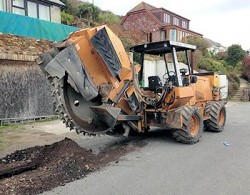BT Could Replace UK Ethernet Excess Construction Charges with Setup Fee

Ofcom has preliminarily agreed to a proposal by BTOpenreach that could result in the operator replacing its sliding scale Excess Construction Charges (ECC), at least some of them, on their point-to-point Ethernet Access Direct products with a single setup fee of around £550 +vat.
According to Openreach, EAD services provide leased line style point-to-point data connectivity between sites that “can be used to build and extend customer networks, develop new infrastructure, and meet low-capacity backhaul requirements (ie up to 1Gb)“.
Advertisement
Meanwhile Excess Construction Charges (ECCs) typically cover the cost of either providing additional services or dealing with “situations where the normal cost of providing service is in excess of that listed within the Openreach price list“. But ECCs, which recently suffered a price rise, can add up to several thousand pounds extra to the installation cost.
For example, in 2012/13 there were 30,616 completed EAD orders and these attracted total ECCs of £38,129,607, which falls to an adjusted ECC spend of £27,410,421 after you factor in recent price changes. But Openreach wants to simplify all of this by exempting the first £2,800 of ECCs and replacing it with a balancing charge of £548, which would apply to all orders for certain EAD services.
Ofcoms Statement
“The proposed change in ECC charging structure is a simple measure that is likely to allow for material improvements in the end-users’ experience of provision of EAD services. We acknowledge that the proposal may have a distributional impact: some CPs or end-users may pay higher ECC than they would have otherwise in the absence of the change while others will pay less.
However we think that the positive effects are substantial enough to outweigh these possible drawbacks. On that basis, we believe the proposed change would be objectively justifiable, proportionate and not unduly discriminatory.”
The “distributional impact” predominantly refers to situations where EAD orders require fewer ECCs than average and that’s “particularly services which terminate in locations already served by fibre, such as exchanges“. It’s also important not to confuse ECC’s with the separate Distance Based Charge (DBC) that can be applied to FTTP on Demand (FoD) lines (though some ECC’s could still apply to certain FoD lines).
Ofcom now expects to consult on Openreach’s proposal until 14th March 2014.
Advertisement
Mark is a professional technology writer, IT consultant and computer engineer from Dorset (England), he also founded ISPreview in 1999 and enjoys analysing the latest telecoms and broadband developments. Find me on X (Twitter), Mastodon, Facebook, BlueSky, Threads.net and Linkedin.
« Virgin Media UK Grows to Reach 4.51m Broadband ISP Subscribers





















































Comments are closed